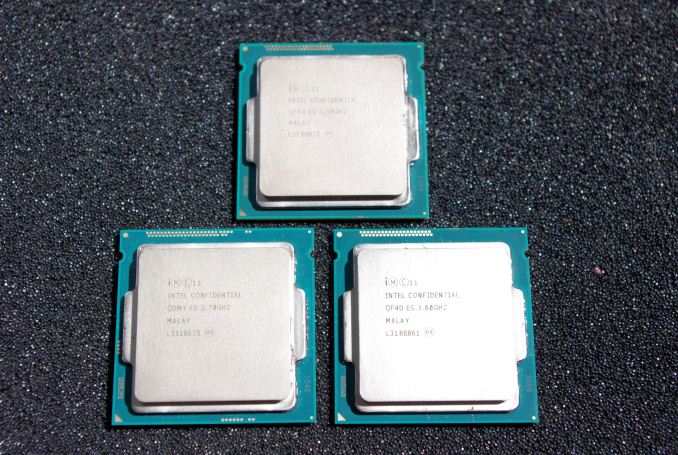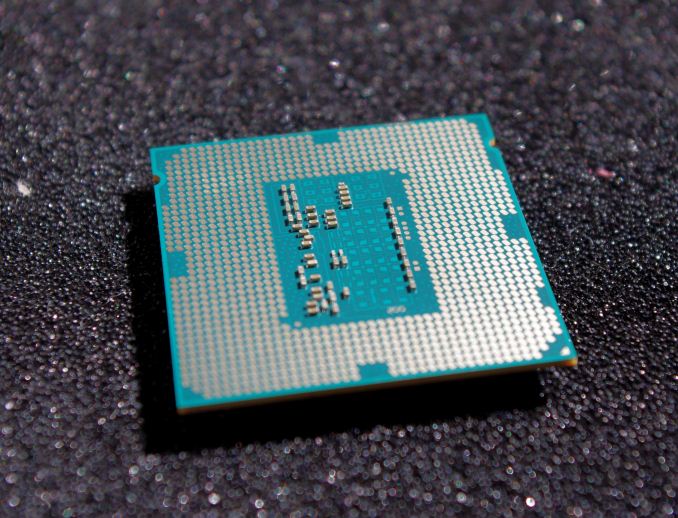The Intel Haswell Refresh Review: Core i7-4790, i5-4690 and i3-4360 Tested
by Ian Cutress on May 11, 2014 3:01 AM ESTConclusions
When a company builds a product that evolves and adapts every generation, unless they are under strong competition on all fronts, the best and brightest will not be released on day one. The company can afford to be more casual in how it approaches the product stack. This allows for updates to be produced during downtime that are just a slightly more aggressive policy revision. In the land of processors, this means more stringent bins or tighter pricing methods. The Haswell Refresh is essentially this – Intel has a long time between major updates (ticks or tocks) and can launch a number of processors in the interim which are more competitive for price and/or performance until the next major update appears.
As expected, the Core i7-4790 CPU that we had beats the i7-4770K in each of the CPU benchmarks by a consistent margin due to the CPU frequency increase. In a similar vein, the IGP of the i7-4790 trails that of the i7-4770K due to the 50 MHz deficit on the side of the i7-4790. There are no surprises here, it has all gone by the book.
While our other CPU matchups were not as ideal as the i7, the i5 and i3 both show their respective positions in the table. The use of the i7-4765T as a low frequency, quad core CPU with HyperThreading also puts in an element of analysis, whereby removing the HyperThreading for the i5-4690 actually puts it ahead on several of the single threaded / high-register requirement benchmarks.
In discrete GPU testing, the CPUs all perform similarly in single GPU conditions. This showcases that high-end CPUs, even for modern games are not needed when it comes to discrete gaming capabilities. This seems especially true for Tomb Raider which comes across as completely CPU agnostic, choosing to offload as much of the work onto the GPU as possible.
In dual GPU conditions, we get more of a landscape of where the Haswell Refresh CPUs stand. The i3-4360, in the same PCIe arrangement as the i5 and i7 CPUs, fails to scale as well as the CPUs with more cores. This equates to about 10% in Sleeping Dogs/Battlefield 4 using the GTX 770s in SLI, or 30% in the same benchmarks using HD 7970s in CrossFire. For users enjoying the higher refresh rate monitors, such as 120 Hz or 144 Hz, this can make a significant difference. The inclusion of HyperThreading with the i7-4790 did not give any advantage in gaming compared to the i5-4690, except in the CPU benchmarks where each thread had minimal register requirements (PovRay, 3DPM).
On the IGP side all of our new CPUs were using the HD4600 solution making comparison straightforward. The i7 seems to have the clear advantage here, with up to 10% performance increase against the i3. The difference between the i7 and i5 however was minimal, but exaggerated in some of the synthetic tests such as 3DMark Cloud Gate which ends up more CPU bound.
For a lot of users interested in overclocking CPUs or who have already moved to Haswell, this refresh will seem almost pointless. It is a chance for Intel to combine the release of a new chipset with a series of CPUs so system integrators and retailers can start selling bundles. For the enthusiasts especially, the new overclocking-focused Devil’s Canyon and Pentium-K processors supposedly coming soon are being awaited with bated breath.
For new users looking to go Intel however, the Haswell Refresh is the new platform to get. It edges out the older CPUs either in terms of performance or price, but not in a massive excitement sort of way. Intel has played it safe, as you would expect when you have a performance advantage.
The last question to consider is if this is the right time to purchase: is there something new around the corner? For the enthusiast, the next generation of enthusiast CPUs (Haswell-E and X99) are due out in the second half of this year, however one would expect the entry point for this platform is around the $500 mark (CPU + motherboard + DRAM). For more mainstream uses, Intel has teased Broadwell news in the form of an unlocked Iris Pro CPU, however that seems to be due more towards the end of 2014/2015 if the Broadwell NUC roadmap is anything to go by. That would mean anyone buying a Haswell Refresh platform today, with a new CPU, would have until the end of the year before it is no longer the latest technology in the more casual desktop market. However, Broadwell processors are assumed to be LGA1150, the same as Haswell, meaning an upgrade should be as simple as replacing the CPU.












130 Comments
View All Comments
ilkhan - Sunday, May 11, 2014 - link
With 9-series, Intel is enabling Rapid Storage Technology 13, allowing UEFI support, RADI 0/1/5/10Think you meant RAID.
Ian Cutress - Sunday, May 11, 2014 - link
Interesting, I remember correcting that a couple of days ago in an edit. Might not have saved. Updated :)ahar - Sunday, May 11, 2014 - link
I await your correction in the conclusion with bated breath. ;)Bugfree - Sunday, May 11, 2014 - link
Reading the conclusions I agree that Intel is somehow underperforming, since...well...they can. No real challengers or competition from AMD at this point. I really hope this changes soon...schizoide - Sunday, May 11, 2014 - link
Exactly. Intel doesn't _need_ to release anything. They essentially have no competitors at the high-end space. AMD's CPUs can't even compete with the i3.nandnandnand - Sunday, May 11, 2014 - link
It would take a miracle to inject competition into the CPU market: http://www.eetimes.com/document.asp?doc_id=1322247Jaaap - Monday, May 12, 2014 - link
We need that miracle.This "Haswell Refresh" is total nonsense. It is just shuffling a bit with names and frequencies.
Where is the looooong overdue desktop quadcore with Iris Pro?
ReaM - Sunday, November 23, 2014 - link
"AMD's CPUs can't even compete with the i3"I think you've read some other article, because A8-7600 destroys the equally priced i3 in most tests.
The gaming benchmarks are skewed towards intel in this review because they've used 1280x1084 resolution on most gaming tests. Many of the games don't run well on full HD and intel.
John3000 - Saturday, November 28, 2015 - link
AMD CPU's like fx 8350 are beaten in some game by i3 by a very small margin but in most they are close to Core i5 and in many AAA Game are near to core i7 in performance.shorne21592159 - Thursday, May 15, 2014 - link
i have just changed to using amd apus after many years using intel chips .im really enjoying amd and what they are doing at the moment with lot of hope for the future and although not as fast as intels at moment they do the job at the moment well for me ,plus i seem to be able to overclock amd chips much more than an intel with less problems for some reason